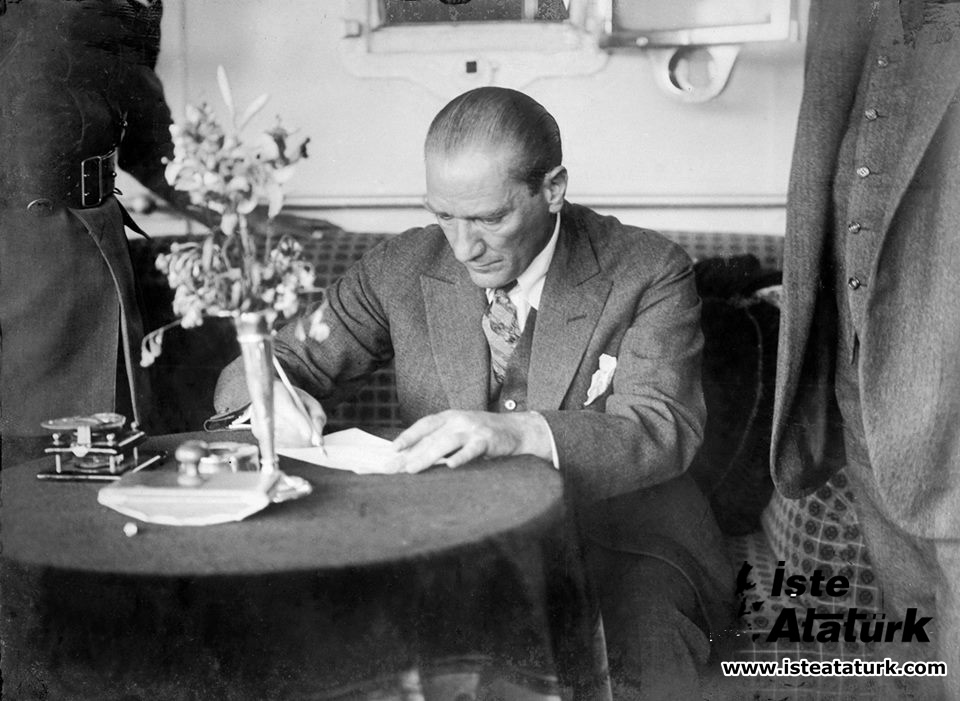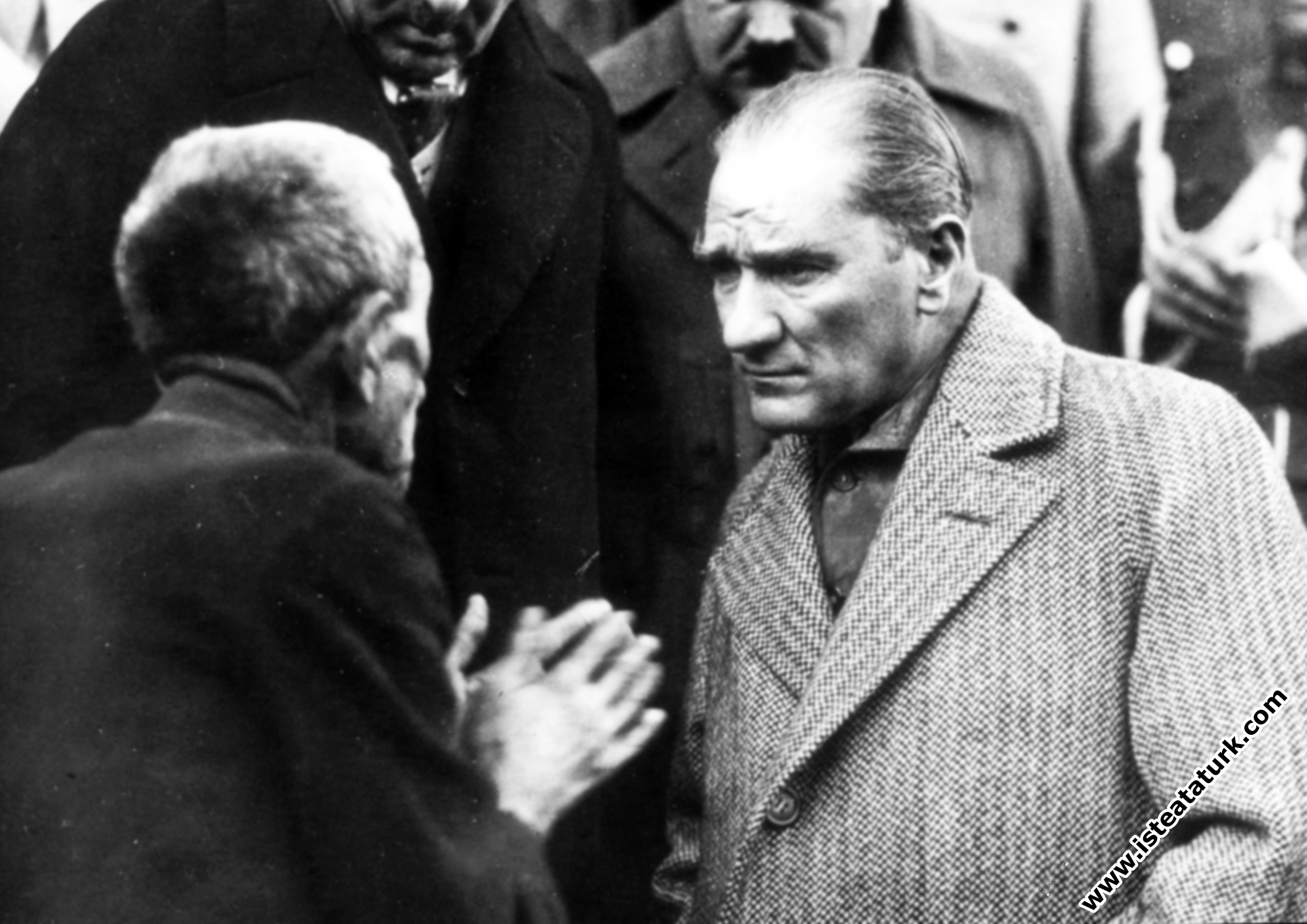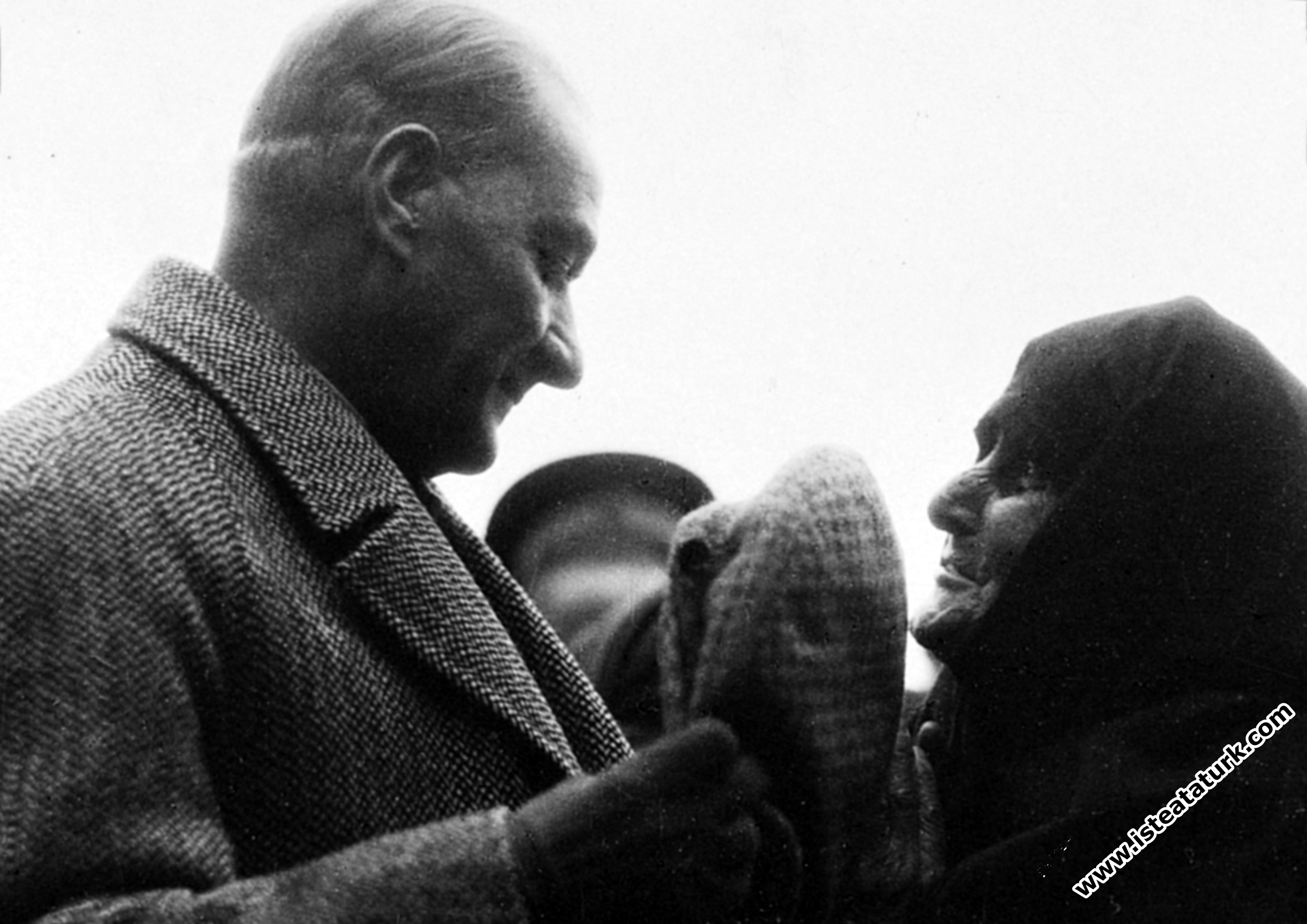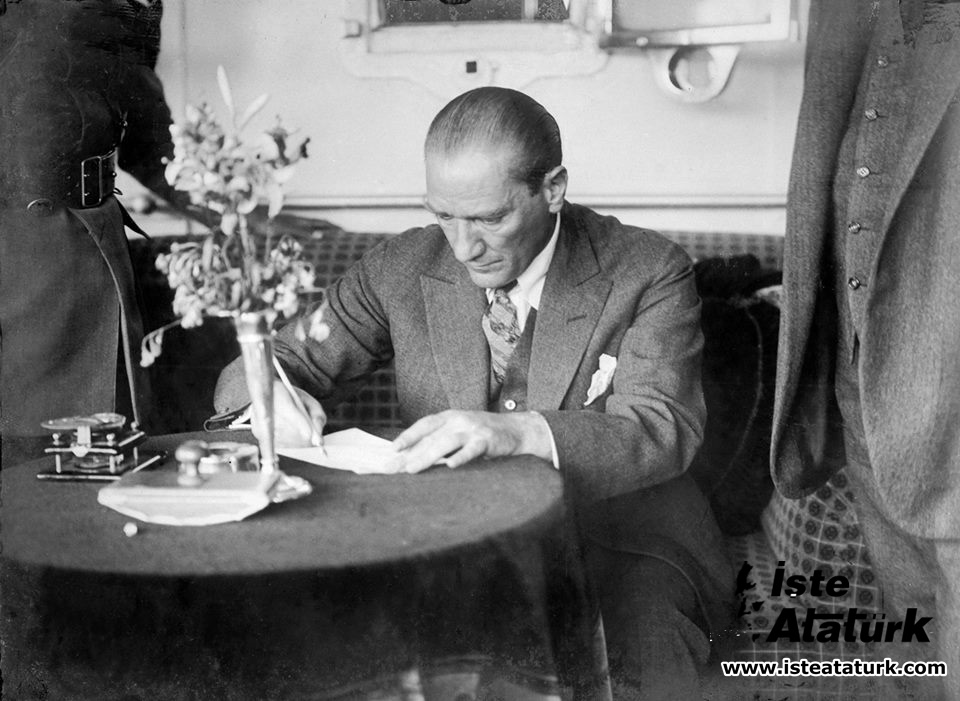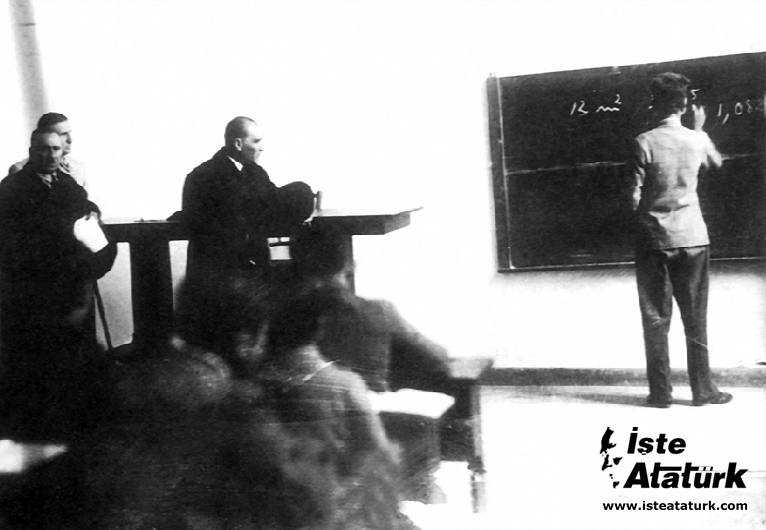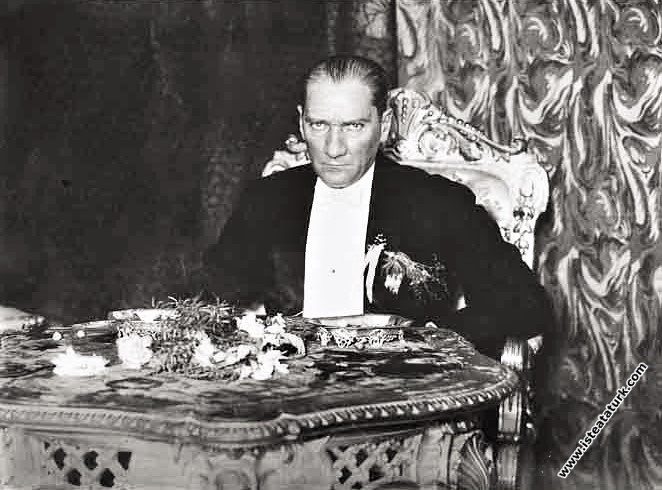
Atatürk and the Republic
Character Size
“The Republic of Turkey will prove with its works that it is worthy of the position it occupies in the world, and it will be happy, successful and victorious” Mustafa Kemal Atatürk
ATATÜRK AND THE REPUBLIC
I
October 29 is the anniversary of our republic, which was declared on October 29, 1923. During the National Struggle, “Republic” lived as an idea and ideal, turning to the Republic became a goal. The Turkish Grand National Assembly convened on April 23, 1920, but the proclamation of the Republic was delayed after the completion of the National Struggle. The Republic, which was proclaimed on October 29, 1923, showed developments that gradually gained a democratic quality in terms of content.
The word “Republic” has come to our language from the Arabic word “people”, “great crowd”. The French equivalent of this word is “La Republique”, the English equivalent is “The Republic” and it is derived from the Latin word “Res Publica” meaning “public property”.
In short, a republic is the government of the people. The only power that will keep the republic alive is the idea of "public interest" based on the political and moral values of the politician and the citizen. With this aspect, the republic is a form of state that is based on the public interest and should be governed according to the public interest, not for the benefit of a person or group. In the ancient Greek cities and in the "Venice" and "Genoese" Republics of the Middle Ages, although the rulers were chosen by a handful of privileged people, the right to vote was given to all citizens in modern times, that is, the "Aristocratic Republic" turned into a "Democratic Republic". Today, the military and junta dictatorships in Central and South America and the People's Republic of China, which is based on Marxist-Leninist theory, do not have the characteristics of democratic republics in the western and modern sense. Because the modern republic is not a class or a group,
The main target in the ideas of Ottoman thinkers, aiming to save the Ottoman Empire from bankruptcy, is not the Republic, but the "Republic that became the Constitutional Monarchy, the intellectual product of the French Revolution and that values human personality against tyranny and oppression", but was sought after with the collapse of the Ottoman Empire. regime has been. Yakup Kadri Karaosmanoğlu says that the French Revolution had an impact on Mustafa Kemal's first strong assertion of the idea of the Republic. He tells in his work “Together with Atatürk From Erzurum Until His Death” that Kemal had told himself that the form of government would be a republic when the time came, before the Erzurum Congress was opened.
As it is known, when the last Ottoman Parliamentary Assembly convened in Istanbul on January 12, 1920, declared the National Pact and was dissolved on March 16, 1920 as a result of the threat of the occupation forces, Mustafa Kemal convened the National Assembly with extraordinary powers on April 23, 1920, in Ankara, In the Constitution dated January 20, 1921, the principle of national sovereignty was declared openly for the first time, and this is Prof. In the words of Ali Fuat Başgil, it meant the establishment of a republic without a president. The Assembly abolished the sultanate on November 1, 1922, in order to represent the Turkish nation and the GNAT government that waged the National Struggle in Lausanne, the Second Assembly convened on August 11, 1923, ratified the Lausanne Peace Treaty, which was signed on July 24, 1923. He declared Ankara the capital in October 1923.
Mustafa Kemal's coining of the word "Republic" for the first time, in a speech he gave to the "Wiener Neue Freie Presse" correspondent on September 22, 1923, had great repercussions both inside and outside the country. On October 28, 1923, Mustafa Kemal said to his friends, “Tomorrow, we will proclaim a Republic”, and submits the draft that changed the Constitution of January 20, 1921 in this direction to the People's Party, which could not find a solution to the government crisis. The resolution taken by the party was presented to the Grand National Assembly of Turkey on the evening of October 29, and the bill was accepted unanimously and with the voices of "Long live the Republic", while Mustafa Kemal was elected to the Presidency with the unanimous vote of 158 members. It is seen that the proclamation of the Republic was the result of the historical development and the implementation of the principle of national sovereignty, and it gradually turned into a democratic political regime in which all citizens benefited and participated.
II
The greatest of Ataturk's Revolutions; is to establish the fully independent, national, modern and secular Republic of Turkey based on national sovereignty. For this reason, our American colleague Prof. Dankward A. Rustow titled one of his articles as “Atatürk as Founder of State”. There is no doubt that the Turkish Republic is not a historyless and rootless state that was created out of nothing like some Asian and African societies freed from colonialism. Because the Turkish nation has a long-established state tradition, and the Ottoman Empire, on the ruins of which the TR was founded, reached a very high military and political level in its 600-year history and was among the most powerful states of its age.
However, as it is wrong to ignore this rich heritage at the birth of the Turkish Republic, it is wrong to think that its new state is a continuation of the Ottoman Empire. Briefly; In the transition from the Ottoman Empire to the Republic of Turkey, the elements of change and the elements of continuity coexist. Indeed, there have been changes in the structure of the Republic of Turkey in terms of country and human community, and the transition from a multinational empire to a national state has been achieved. In other words, although the empire is a multi-national state that hoped for help from the ties of Ottomanism and sometimes Islam, but failed to do so, the Turkish Republic is a completely new state based on the human element of the Turkish nation.
the date of 29 October 1923; It represents the transition from the semi-independent Ottoman Empire to the fully independent Republic of Turkey. Because we know that the Ottoman Empire has been referred to as the "sick-man" in the last centuries in European political circles and it has been openly discussed how to share its heritage under the name of the "eastern problem". As Atatürk said in his opening speech at the Izmir Economic Congress, “A state cannot be called independent if it cannot impose taxes on foreigners, if it is prohibited from regulating customs duties and is deprived of exercising its jurisdiction over foreigners”. For this reason, one of the two principles that Atatürk insistently emphasized is full independence and the other; is national sovereignty.
Yes, the transition from the sultanate to the republic is the transition from personal sovereignty to national sovereignty. In fact, before the abolition of the sultanate, the TGNA openly declared the principle of national sovereignty with the Constitution of January 20, 1921. Because the administration befitting modern society and the state can only be administration based on national sovereignty. Mustafa Kemal states the following in the negotiations for the abolition of the sultanate: “The Turkish nation, which established a Genghis, a Seljuk, an Osman state in the history of the world, this time established a state directly in its own name and title. Taking his national destiny in his hands, he represented the national sultanate and sovereignty not in a single person, but in the assembly consisting of deputies elected by the nation. In short, the new Turkish state is not the "eshas state" but the "people's state". National sovereignty is against all personal government. There are no traders in the Republic of Turkey, There is no dictator and there will never be. There is only one power at the head of the state and that is national sovereignty.
III
At the beginning of the reasons that led Atatürk to the Republic; In his youth, Atatürk lived in the belief that the only political regime that would realize Turkey as a Modern State and a Modern Society was the Republic. Young Kolağası Mustafa Kemal, who was not satisfied with the 1908 Revolution that ended 31 years of tyranny and restored the constitutional monarchy, continued his longing for the Republic.
On the other hand, the Republic is very suitable for the character of Atatürk and the Turkish Nation. “Liberty and independence are my character. I am a man who was created with the love of independence, which is the most precious legacy of my nation and my great ancestors. For this reason, I think national independence is a matter of life,” said Atatürk, and he considers the Republic, which is the most suitable administration for freedom and independence, to be suitable for the nature of the Turkish Nation, which is extremely fond of freedom and independence.
Another important reason that led Atatürk to the Republic; It is because the Republic is the most advanced form of state and government. The main feature of the Republic is that it is based on Nation Sovereignty and adopts Democracy as a system. Indeed, although every democratic regime is not a republic, the most developed form of democracy is provided by the Republic. Atatürk also called the Republic "People's Government" and said, "The People's Government is a government that gives complete sovereignty to the people and works for the people".
According to Atatürk; The contemporary government of the civilization world is the Republic. Republic is the order of human life. The ideal of living humanely was one of the reasons that led Atatürk to the Republic. Atatürk founded and defended the Republic because it is the expression of a free and fair order that will make people happy.
We see that the founder of the Republic, Atatürk, evaluated the Republic in his various speeches. As a matter of fact, in a speech he made in Izmir on October 14, 1925, Mustafa Kemal emphasized that with the establishment of the Republic, there was no separation between the Government and the Nation, and he said, "Government is now the Nation and the Nation is the Government".
In the opening speech of the Turkish Grand National Assembly on 1 November 1929, he sees the Republic as a "State Power"; The internal policy of the Republic is to ensure the life of the citizen without being influenced by any influence or attack.” He praises the service and sacrifice of the Republican gendarmerie and police, namely the security forces.
In the opening speech of the Turkish Grand National Assembly on November 1, 1933, Atatürk addressed the Republic as the “state form” and said, “This year, we were happy to celebrate the 10th Anniversary of the Republic. The nation has collectively reviewed the works of the Republic of the past 10 years and saw that it has the right to rejoice and brag.
While Atatürk was celebrating the 10th anniversary of the Republic in 1933, he took the Turkish Revolution and the Republic synonymously; "We made great and lots of things in such a short time. He said that the biggest of these works is the Republic of Turkey, which is based on Turkish heroism and high Turkish culture. For Atatürk, the Republic is a goal. Due to his election to the Presidency, he said his belief in the Republic, "The Republic of Turkey will prove with its works that it is worthy of the position it occupies in the world, and it will be happy, successful and victorious."
Atatürk, who attaches great importance to the concept of National Sovereignty, the basis of the Republic, opposed the proposal for a lifetime Presidency, which is incompatible with the Republic, and in his statement to the editor-in-chief of Akşam Newspaper, he clearly stated that the Presidency and the Prime Ministry cannot be gathered in the same person, and the American "Prime Ministry" system, which envisages the gathering of all powers in the Presidency. Emphasizing that he never thought about it and that it would be unsystematic and unlawful, he expressed his commitment to the Turkish Constitutional system.
According to Atatürk, the Republic is a government based on virtue. Republic is virtue. In short, Atatürk; He defines the Republic as the "Order of Virtue", and expresses the fact that the Republic will be based on the whole nation through virtue and justice, and without this, there would be no "Republic".
IV
While celebrating the Founding Anniversary of the Republic, it is wrong to look for the meaning and qualities of TR only in the articles of the Constitution. Because it is not easy to reflect the "abstract" moral values behind the "concrete" qualifications in the Constitution. The source for this is the depths of our history and Atatürk's statements. The moral values that support and complement the basic qualities of the Turkish Republic are centered around points such as “The Republic is Virtue”, “Contemporary and civilized and open to change with development”, “Scientific guidance and rationality” and finally “National Pact and Unconditional Sovereignty”. It is possible to collect.
Atatürk, on 14 October 1925, told the students of İzmir Teacher's School, “The Republic is Virtue. The Republic raises virtuous and honorable people. Virtue in the political sense encompasses the qualifications required of statesmen and politicians. In Atatürk's words, it is not our principle to follow daily politics against the nation by saying, "We do things that we are not in the power to do with drugs and distracting words." The country is in need of a solid unity, and it is treason to break up the nation with ordinary politics. An honest, open policy and commitment to our words will constitute our greatest strength today and tomorrow.” One of the values that support the basic characteristics of the Republic of Turkey is its openness to development and change, aiming to bring Turkish society to a modern and civilized level. In his speech in Kastamonu on August 30, 1925, Atatürk said, “The aim of the revolutions we have made and are making is to transform the people of the Republic of Turkey into a completely modern and civilized society.” We will provide it as the main pillar of the nation” and in the opening speech of the Turkish Grand National Assembly on November 1, 1937, “Our great cause is to increase our existence as the most civilized and prosperous nation. This is the dynamic ideal of the Turkish nation, which has made a fundamental revolution not only in its institutions but also in its thoughts," and emphasized that the Turkish revolution is not "static" but "dynamic". In another speech, Atatürk said, “We have a distinguished people who love and want to progress, rise and take care of the century. Give something positive to the Turk, he cannot refuse it. of the people, The desire to transcend darkness and attain prosperity and well-being is palpable. The hand of the Republic has taken hold of this desire," and revealed that the administration of the Republic must fulfill the people's desire for progress and that innovation is a must in order to be civilized. One of the important values of TR is to believe in the guidance of science, to stay away from dogmas, that is, to be rational. In his speech at Samsun Istiklal Trade School on September 22, 1924, Atatürk said, “For everything in the world, science is the truest guide for materiality, for spirituality, for life, for success. It is essential to follow the progress and progress in a timely manner," he said to the members of the Teachers' Union Congress in the same year, He gave the message that "the Republic demands from you generations with a free mind, a free conscience, and a free knowledge". Finally, another important moral value that supports and complements the basic characteristics of our Republic is the commitment to the National Pact and National Sovereignty. As it is known, the National Pact has drawn the borders of a national and indivisible Turkish country, and with this, the people of the Turkish country have reached the consciousness of independence. While Atatürk was opening the 4th year of the Turkish Grand National Assembly on March 1, 1923, giving special attention to the National Pact and National Sovereignty; “Today we are stronger than the past. What makes this superiority? We have to repeat this over and over again quite clearly. The real reason for this is within the scope of two concepts. One of these concepts is the National Pact, and the second is our Constitution, which unconditionally holds sovereignty. Atatürk's concept of “Full Independence” gains great importance in terms of the current environment of the country and the changing world balances. We have to be vigilant against new political and economic formations between states, slogans such as human rights and peace that are not implemented much, and deceptive words that will destroy our full independence.
IN
The rational and secular republic founded by Atatürk, based on national sovereignty, has undergone great development since 1923, making Turkey the only democratic, secular and free market economy-based country in the Islamic world today. For this reason, even the Western world sees our Republic as a natural "model" for the newly independent Turkic Republics. However, “some intellectuals and writers who have ideas without having knowledge” started the “Second Republic” debate, claiming that the Republic established by Atatürk did not realize the rule of law and could not increase its production, that is, it was exhausted.
As a matter of fact, the "Second Republic Debate" was put forward for the first time during the introduction of the 1961 Constitution with social and economic content instead of the 1924 Constitution, and the late Prof. Dr. While Turan Güneş, inspired by Atatürk's words "The Republic will stand forever" and trying to end this discussion by saying "The Republic of Turkey is one", the author of these lines does not say that with these words of Atatürk, changes cannot be made in the political and social structure of the Republic, but that the sultanate in this country cannot be changed. He claimed that he wanted to express that he would never resurrect.
However, the debate that started today is of a different nature, arguing that the Republic, which will be 73 years old in 1996, has failed to increase production and ensure the rule of law, and makes many false claims. The short answer to these claims is as follows: Thanks to Atatürk's secular and rational system, the Republic of Turkey has made great progress in the direction of the rule of law and the market economy, and today it has approached Western European standards. On the other hand, we know that Turkey has realized the F-16 aircraft construction, the GAP project, and that Turkish contractors have successfully carried out billions of dollars of commitments in various countries.
Moreover, if there are some deficiencies in the rule of law, production and privatization today, it is up to the political parties and their cadres to complete them. The claim that Turkey's constitutions were prepared by soldiers is also not true. The 1921 and 1924 Constitutions were not prepared by the military, and the 1961 and 1982 Constitutions were prepared entirely by civilian representatives and assemblies, and the contribution of the National Unity Committee and the National Security Council to these Constitutions remained at a very minimum level.
And yet, it is not surprising that these Constitutions were attacked more than the 1958 Constitution of General de Gaulle, which the soldiers brought to power in France, and even the 1947 Japanese Constitution, which was prepared during the American military occupation, and that the Turkish army was so allergic. Finally, the claim that the National Security Council is above the parliament is untrue, as can be understood from Article 118 of the 1982 Constitution regarding the National Security Council. In short, the arguments in favor of the second republic are, in our opinion, a heap of nonsense, whose stylistic brilliance hides behind it.
Prof. Dr. Ismet Giritli*
*Former Member of Atatürk Research Center Scientific Committee
Source: ATATÜRK ARAŞTIRMA MERKEZİ DERGİSİ, Sayı 33, Cilt: XI, Kasım 1995
